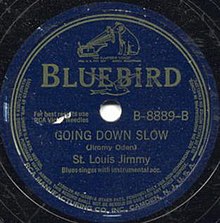
Chester Arthur Burnett, better known by his stage name Howlin' Wolf, was an American blues singer and guitarist. He was at the forefront of transforming acoustic Delta blues into electric Chicago blues, and over a four-decade career, recorded blues, rhythm and blues, rock and roll, and psychedelic rock. He is regarded as one of the most influential blues musicians of all time.

Roosevelt Sykes was an American blues musician, also known as "the Honeydripper".
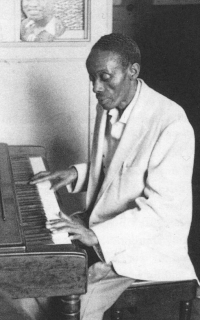
James Burke "St. Louis Jimmy" Oden was an American blues musician and songwriter.
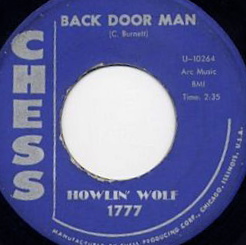
"Back Door Man" is a blues song written by American musician Willie Dixon and recorded by Howlin' Wolf in 1960. The lyrics draw on a Southern U.S. cultural term for an extramarital affair. The song is one of several Dixon-Wolf songs that became popular among rock musicians, including the Doors who recorded it for their 1967 self-titled debut album.
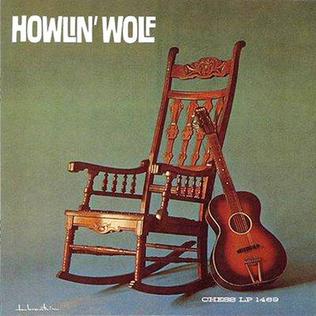
Howlin' Wolf is the second album from the Chicago blues singer/guitarist/harmonicist, Howlin' Wolf. It is a collection of twelve singles previously released by the Chess label from 1960 through 1962. Because of the illustration on its sleeve, the album is often called The Rockin' Chair Album, a nickname even added to the cover on some reissue pressings of the LP.

"On the Road Again" is a song recorded by the American blues rock group Canned Heat in 1967. A driving blues rock boogie, it was adapted from earlier blues songs and includes mid-1960s psychedelic rock elements. Unlike most of Canned Heat's songs from the period which were sung by Bob Hite, second guitarist and harmonica player Alan Wilson provides the distinctive high pitched vocal, sometimes described as a falsetto.

The London Howlin' Wolf Sessions is an album by blues musician Howlin' Wolf released in 1971 on Chess Records, and on Rolling Stones Records in Britain. It was one of the first super session blues albums, setting a blues master among famous musicians from the second generation of rock and roll, in this case Eric Clapton, Steve Winwood, Charlie Watts, and Bill Wyman. It peaked at #79 on the Billboard 200.
"Wang Dang Doodle" is a blues song written by Willie Dixon. Music critic Mike Rowe calls it a party song in an urban style with its massive, rolling, exciting beat. It was first recorded by Howlin' Wolf in 1960 and released by Chess Records in 1961. In 1965, Dixon and Leonard Chess persuaded Koko Taylor to record it for Checker Records, a Chess subsidiary. Taylor's rendition quickly became a hit, reaching number thirteen on the Billboard R&B chart and number 58 on the pop chart. "Wang Dang Doodle" became a blues standard and has been recorded by various artists. Taylor's version was added to the United States National Recording Registry in 2023.

"Little Red Rooster" is a blues standard credited to arranger and songwriter Willie Dixon. The song was first recorded in 1961 by American blues musician Howlin' Wolf in the Chicago blues style. His vocal and slide guitar playing are key elements of the song. It is rooted in the Delta blues tradition and the theme is derived from folklore. Musical antecedents to "Little Red Rooster" appear in earlier songs by blues artists Charlie Patton and Memphis Minnie.
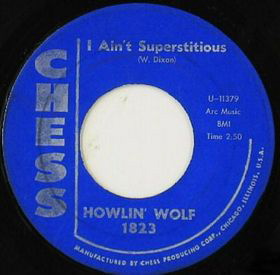
"I Ain't Superstitious" is a song written by bluesman Willie Dixon and first recorded by Howlin' Wolf in 1961. It recounts various superstitions, including that of a black cat crossing the pathway. The song has been recorded by a number of artists, including Jeff Beck, whose blues rock adaptation in 1968 was named one of Rolling Stone magazine's "100 Greatest Guitar Songs of All Time".
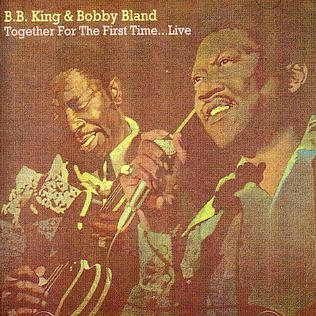
Together for the First Time... Live is a 1974 blues album by singer Bobby Bland and guitarist B. B. King. The duo later recorded Bobby Bland and B. B. King Together Again...Live. Bland and King toured together extensively in the 1970s and 1980s, which did much to keep their careers alive during a period of otherwise popular decline for the blues genre.

"Forty-Four" or "44 Blues" is a blues standard whose origins have been traced back to early 1920s Louisiana. However, it was Roosevelt Sykes, who provided the lyrics and first recorded it in 1929, that helped popularize the song. "Forty-Four," through numerous adaptations and recordings, remains in the blues lexicon eighty years later.
Otis "Big Smokey" Smothers was a Chicago blues guitarist and singer. He was a member of Howlin' Wolf's backing band and worked with Muddy Waters, Jimmy Rogers, Bo Diddley, Ike Turner, J. T. Brown, Freddie King, Little Johnny Jones, Little Walter, and Willie Dixon. His younger brother, Abe, was the bluesman Little Smokey Smothers, with whom he is sometimes confused.

Long John's Blues was the début solo album by British blues singer Long John Baldry and his band, the Hoochie Coochie Men, featuring musicians who had previously played alongside Baldry in the Cyril Davies All-Stars. The album featured a track list that he would continue to play at live shows throughout his career.

His Best is a greatest hits album by American blues musician Howlin' Wolf. The album was originally released on April 8, 1997, by MCA/Chess Records, and was one of a series of releases by MCA for the 50th anniversary of Chess Records that year. Ten years later – on April 17, 2007 – the album was reissued by Geffen Records as The Definitive Collection.
"Early in the Morning" is a blues song that was recorded by Sonny Boy Williamson I in 1937. Identified as one of his most successful and influential tunes, it was inspired by earlier blues songs. "Early in the Morning" has been recorded by various musicians, including Junior Wells, who made it part of his repertoire.

Blues Around the Clock is an album by blues vocalist Jimmy Witherspoon which was recorded in 1963 and released on the Prestige label.

Alone with My Friends is an album by American blues pianist Memphis Slim which was recorded in 1961 and released on the Battle label. The album, recorded in London during a European tour, is an exploration of the blues repertoire in terms of songs associated with blues singers Big Bill Broonzy, Tampa Red and Georgia Tom, Muddy Waters and Willie Dixon, Curtis Jones, St. Louis Jimmy, Sonny Boy Williamson and Blind Lemon Jefferson.

The Super Super Blues Band is an album by blues musicians Howlin' Wolf, Muddy Waters and Bo Diddley released on the Checker label in 1968.
Warren George Harding Lee, known professionally as Lee Jackson, was an American Chicago blues guitarist, bass guitarist, singer and songwriter. Although he did release a number of recordings in his own name, such as Lonely Girl (1974), he is most known for his work on recordings with other blues musicians such as Johnny Shines, Willie Dixon, Jimmy Reed, J. B. Hutto, Sunnyland Slim, Lacy Gibson, and Little Walter. AllMusic noted that "the playing style of Jackson is vastly influential".
